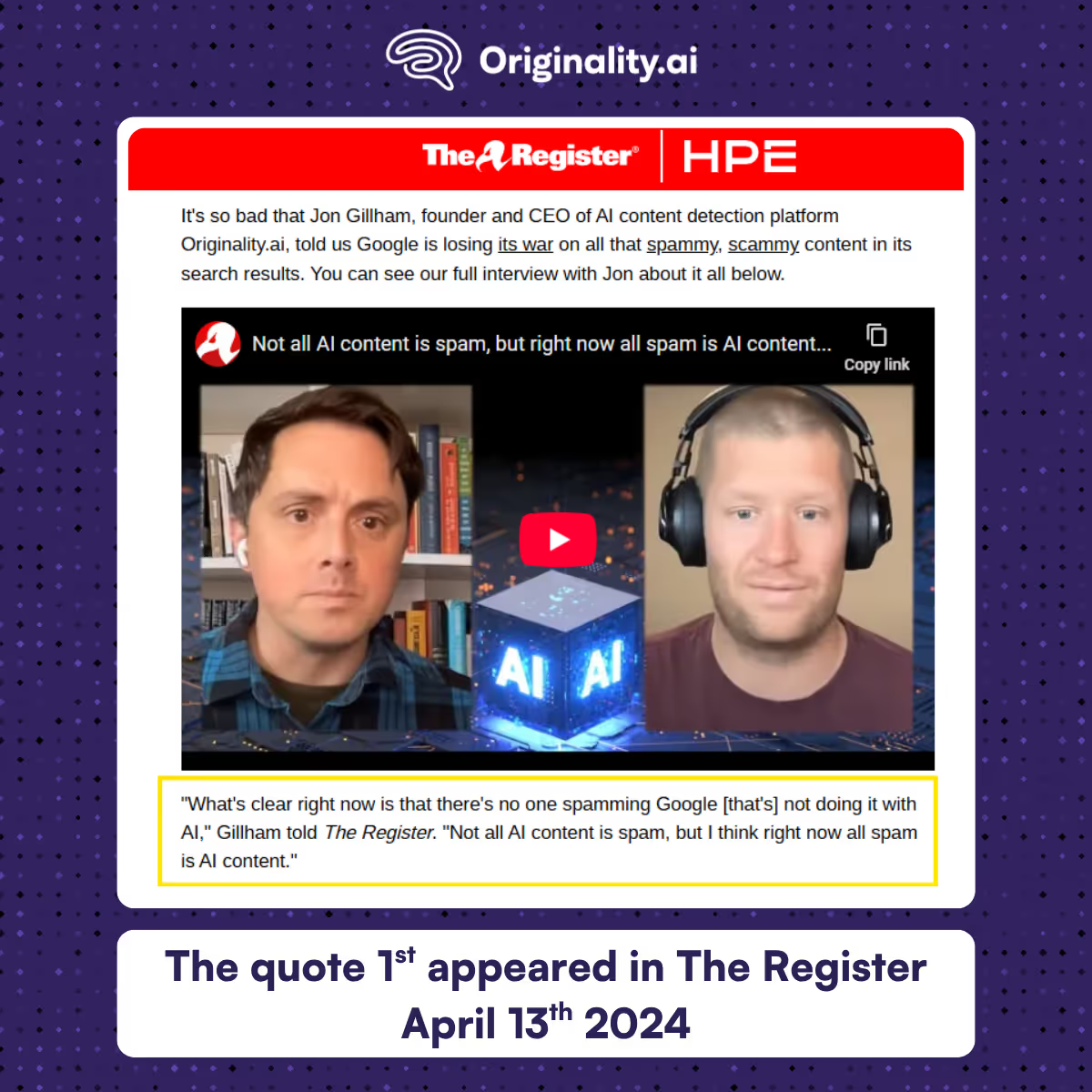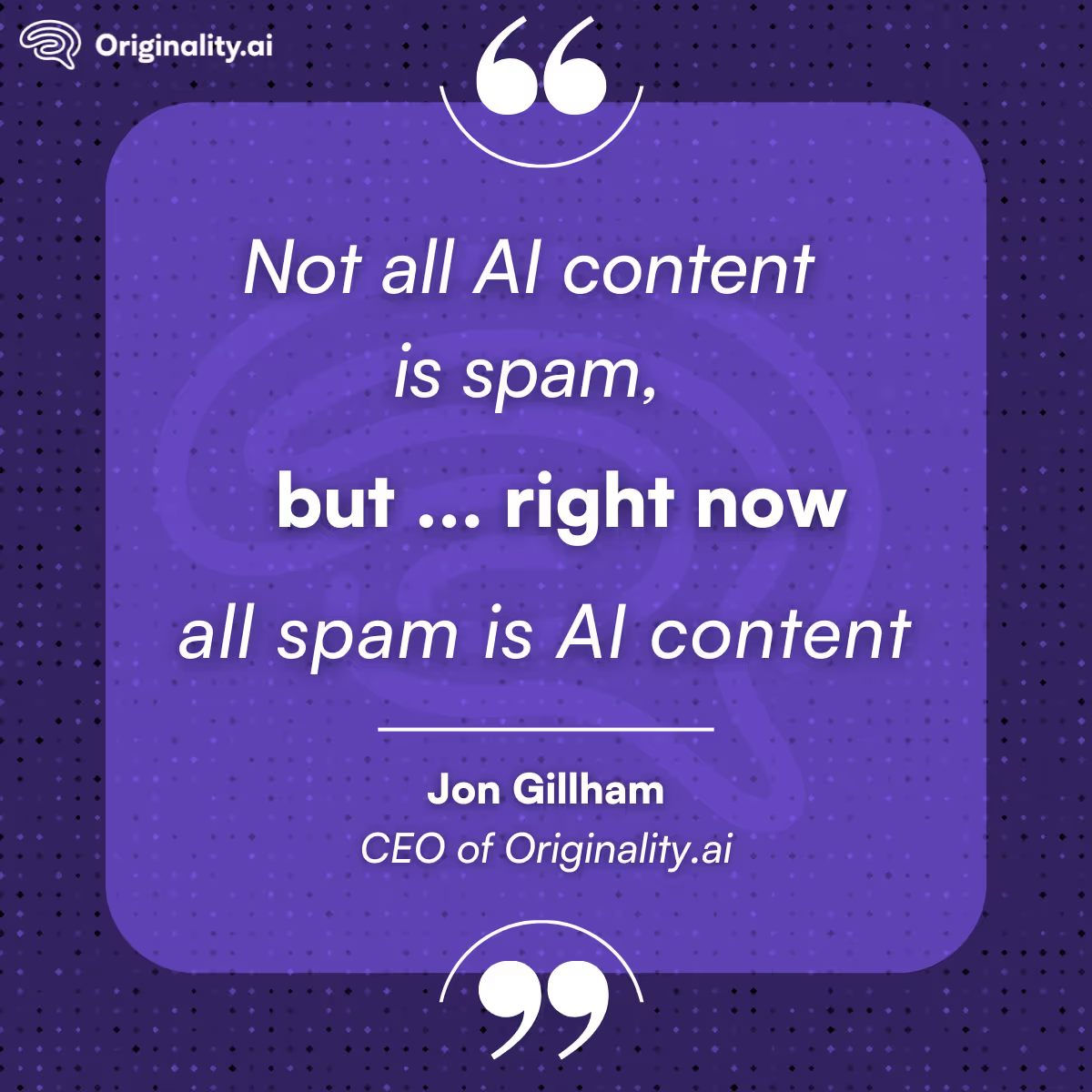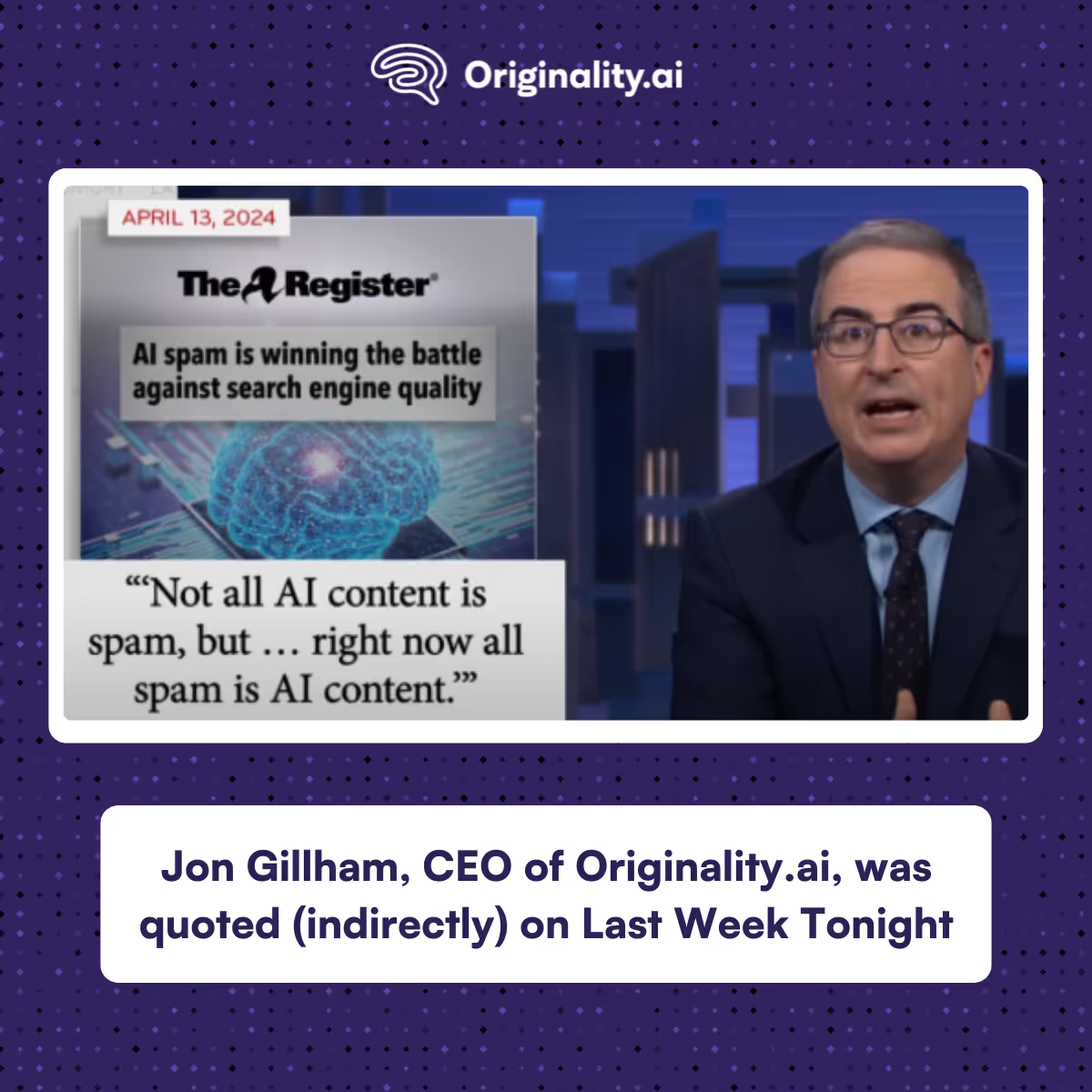For a while now, it’s felt like certain corners of the internet are drowning in low-effort, AI-generated content, and it’s finally getting the mainstream attention it deserves.
At Originality.ai, we’ve been tracking this trend for quite some time now, and our founder Jon Gillham even referenced it last year in an interview.
Now, given its launch into the mainstream after Last Week Tonight with John Oliver picked up on the same theme, and indirectly quoted Jon Gillham (more on that below), we thought it best to assess what the phrase ‘AI slop’ really means.
Find out what AI slop is, and why it should be something any publisher, marketer, and SEO professional is aware of.
Looking for a quick overview of the Last Week Tonight segment featuring Jon Gillham’s (indirect) quote? Watch the video below:
First off, what does the term ‘AI Slop’ actually mean? The term AI slop describes the wave of low-quality, AI-generated content that is currently flooding the internet.
The content is technically readable, even SEO-optimized in some cases, but generated at scale. As a result, it completely lacks any originality, any depth, or any human insight.
Basically, it’s incredibly bland.
It may not be obvious to everyone at first, but once you’re a few paragraphs in and you realize the content has skirted around the subject at best, you’ll quickly notice it’s AI-generated with minimal additional effort added to the piece.
As Jon mentioned last year, in an interview published with The Register, "What's clear right now is that there's no one spamming Google [that's] not doing it with AI."
This has created an internet filled with “AI Slop,” an endless buffet of fast-food content. Easy to make, cheap to consume, and unhealthy for the internet’s ecosystem.
At Originality.ai, we define AI slop as ‘mass-produced, machine-generated content that adds volume, not value.’
So, why’s it spreading if it’s so bland and forgettable? Well, in simple terms, it’s a combination of time-saving and opportunity.
The sudden accessibility of large language models (such as ChatGPT) has allowed marketers, publishers, and SEOs to scale content in a way that wasn’t conceivable even five years ago.
For those who believe the best results on search come from producing more content, these tools are then used to produce thousands of ‘SEO-friendly’ blogs at scale, in the hope of improving brand authority and search rankings, therefore improving traffic and conversions.
However, this isn’t 2015. The SEO landscape has drastically changed since then, and it now takes a lot more than a few articles with keywords stuffed into them to perform well on Google.
Not only that, but LLMs can only repurpose what they already know, meaning it is never able to formulate new ideas, insightful perspectives, and offer anything of true value to the reader.

As a longtime publisher, SEO strategist, and entrepreneur himself, Jon saw the trend emerging early: AI tools were enabling a race to the bottom in content production.
While others were celebrating scale, Jon was asking what happens when the internet is flooded with unoriginal, untrustworthy content?
In an interview with The Register on April 13, 2024, Jon said, “Not all AI content is spam, but I think right now all spam is AI content.”

These concerns around AI spam and AI slop and its broader impacts were brought up again in his conversation with the AI Marketing Navigator, expressing the impact this may have if left unchecked:
“If Google’s search results are filled with nothing but AI-generated content, then why would people go to Google? Why wouldn’t they go to the AI that generated that content?” (2:30 mark)
Jon has also backed up these words with meaningful actions.
At Originality.ai under his leadership, we have responded to this growing threat by building industry-leading AI detection software, allowing people to detect AI-generated content before it pollutes search results or damages publisher trust.

In a recent episode of Last Week Tonight, John Oliver took aim at the rise of generative AI and AI slop.
Oliver speaks on the wave of low-quality AI-generated content or “AI slop,” stating, “AI Slop is basically the newest iteration of spam.” (3:24 mark)
Then, Oliver goes on to say moments later, “As the CEO of one AI content detection platform put it, ‘Not all AI content is spam, but … right now all spam is AI content.’ ” (3:26 mark)
This mirrors Jon’s original quote from The Register, almost word for word (noted earlier in this article), echoing a warning he has been making for several years now.
John Oliver isn’t just known for making subjects funny. He also makes them real to millions of his viewers.
His commentary reflects what Jon has long been saying: this is a mainstream problem that affects digital trust, search quality, and public knowledge.
It also highlights that these issues aren’t just related to publishing; there are also cultural and societal impacts.
At Originality.ai, you’d be forgiven for thinking that we are anti-AI, but that couldn’t be further from the truth.
We aren’t for or against AI-generated content… but believe in transparency and accountability in its development, use, and detection, as noted in our AI detection accuracy study.
Artificial intelligence has a role to play in the content production process, but only when used correctly and transparently.
The danger is the impact that using AI tools to flood the internet with AI slop will have.
That’s why Originality.ai helps publishers, marketers, and agencies maintain editorial standards (including transparency around what is and is not AI-generated content) in an AI-assisted digital world.
Our AI software allows you to know whether your content is getting flagged as human or AI. This gives publishers confidence that the articles they are publishing are truly unique.
Hopefully, this recent mainstream attention is the start of a bigger wave, and we can begin truly discussing the impacts of reckless AI usage.
It’s a mainstream concern, and one that is shaping how users, platforms, and audiences evaluate trust online.
Maintain transparency and produce content your audience truly wants to read with unique insights, research, and perspectives.
Then, if you’re not sure whether something you’re reading was human-written or AI-generated, use the best-in-class Originality.ai AI Checker.
Get more insight on AI and AI detection:
